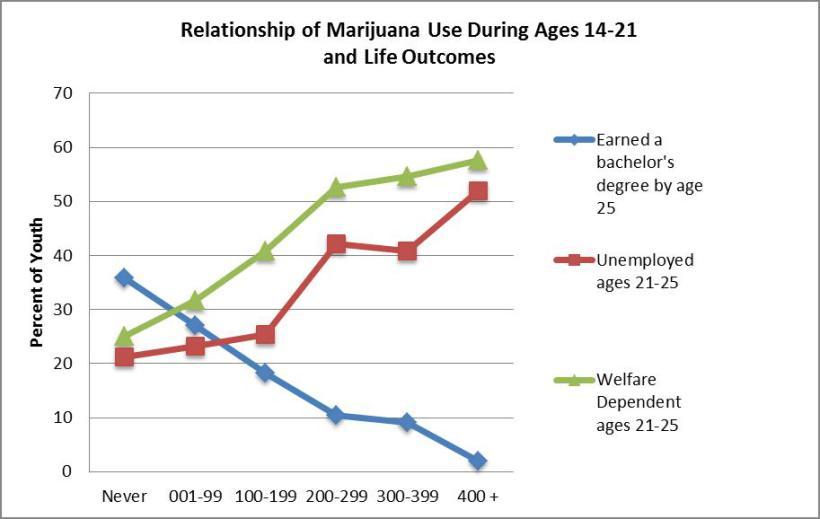Although the pro-pot movement may be celebrating the new ruling on the legalization of marijuana, it is equally important for them to inquire about the side effects of legalizing the drug. We cannot deny the fact that the consumption of marijuana has several negative health outcomes. Worst of all, it has now been legalized in the two states for the purpose of recreation (The Huffington Post par. 1).
Across the globe, most governments consider marijuana as a major setback in psychological health. The American perspective has often been directed towards the elimination of hard drugs such as marijuana and cocaine. How is it that Washington and Colorado’s states have legalized bang after fighting its menace for all that long? Is it that they have eventually lost the war on harmful drugs?
The recreational use of marijuana should not warrant its legalization. It is surprising that some sections of the media have described the ruling as an ‘unprecedented win’ for the pro-marijuana movement. If the legalization was based on the medical benefits of the drug, then it could have driven some sense into the American public.
Legalizing marijuana will definitely make it cheaper in the market in spite of the associated taxes that will be levied by the respective state authorities. This move will also translate to increased consumption of the drug. Consequently, there will be an upsurge in the number of victims seeking help in psychiatric centers.
Medical research on the use of marijuana indicates that it contains more cancer-causing substance than tobacco. The health impact of five regular cigarettes has been equated to one cannabis joint. Hence, marijuana can damage the user’s lungs five times more than ordinary tobacco. The respiratory tract is also inflamed quite easily when an individual smokes bhang.
Several years dedicated to the study of marijuana have revealed that the drug poses serious mental health impacts on users. In a 2008 empirical study in Australia, over 60% of long term users of marijuana were found to be suffering from various forms of brain abnormalities. Negative brain changes, coupled with memory loss, are some of the drawbacks in the consumption of bhang.
The taxes collected by the Colorado and Washington states may, in fact, be turned into the rehabilitation of psychologically derailed victims. Operating in a legal environment does not imply that users will be cautious when smoking the drug. It merely exposes the American population to long term risks of marijuana.
Young adolescents and the general youthful population will also be remarkably affected by this legalization. Joseph Boden and David Fergusson conducted and compiled a “birth cohort” study that spanned for a period of 25 years (Brody par. 2). The study embarked on various developmental aspects of children from birth in different environmental conditions.
From the study, it was found out that specific outcomes are witnessed in later life depending on the growth environment of a child. In a wrap up of the study, the two researchers concluded with the graphical representation below. Three distinct measures have been illustrated in the chart. The measures include youths with bachelor’s degree besides those who are in gainful employment as well as the ones who are not employed. The young people included in the survey range between 14 and 21 years.

From the study, it is evident that college dropouts are rife among youths who smoke marijuana. However, over 40 percent of the youths surveyed managed to graduate from higher learning institutions by the age of 25 years (Brody par. 4). Needless to say, legalizing marijuana will negatively affect our education system.
It is indeed true that sizing up the market cannot be an easy task as much as the drug has been legalized. Both the Colorado and Washington states are focusing on the revenue that will be generated from taxes. However, the tax income may, after all, be insignificant, especially if other marketing paradigms are put into consideration.
Marijuana has undergone a long period of prohibition across the world. Several governments have put in place stricter pieces of legislation to curb the smoking of bang. Although such legislations are sometimes flouted by drug barons, the consumption of this harmful drug is still considered to be extremely hazardous to both physical and mental health.
Authorities from both the Washington and Colorado states should realize that marijuana consumption will derail economic development. For example, heavy consumption of the drug among the unemployed youthful generation will aggravate the degree of crime. Additional resources will have to be allocated to fight crimes related to the smoking of bhang.
Works Cited
Brody, Janet. Lost in the Weeds: Heavy Teenage Marijuana Use Reduces Later Life Satisfaction and Success. 2012. Web.
The Huffington Post. Legalizing Marijuana In Washington And Colorado Could Decrease Cost For Users. 2012. Web.